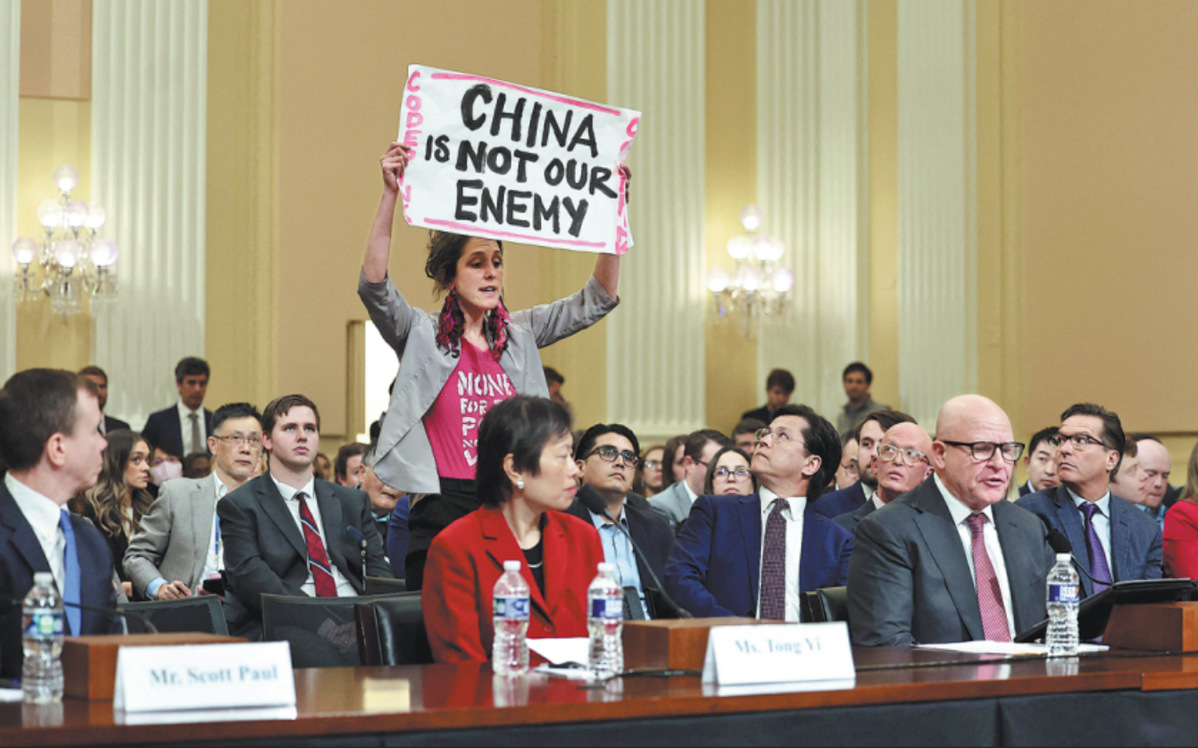US House's new panel on China should look inward
By William Jones | China Daily Global | Updated: 2023-03-03 09:18

In appropriate triumphalist mode, the newly minted United States House select committee on China met in an unusual evening first session on Tuesday, eager to command attention so that the widest possible viewing public could hear their weighty arguments.
The bipartisan committee, pulled together by Representative Mike Gallagher, a Republican from Wisconsin, who has made a career of China-bashing, was meant to increase the scope of legislation in the US Congress to suppress China's economic and technological growth.
Gallagher depicted the competition between the US and China as "an existential struggle over what life will look like in the 21st century".
Tuesday's hearing was interrupted by two protesters, one of whom said, "This committee is about saber-rattling, it's not about peace." Both were removed from the hall.
A spokeswoman for China's Foreign Ministry called on Wednesday for the committee's members to "discard their ideological bias and zero-sum Cold War mentality "and "view China and China-US relations in an objective and rational light".
The spokeswoman, Mao Ning, also said the committee should "stop framing China as a threat by quoting disinformation, stop denigrating the Communist Party of China and stop trying to score political points at the expense of China-US relations".
Listening to some of the rhetoric from Gallagher and from witnesses like Matthew Pottinger, former president Donald Trump's "whisperer" on China policy, and General H.R. McMaster, former national security adviser, you would have thought that you were in a hearing in the 1950s chaired by Senator Joseph McCarthy.
It also hearkened back to the discussions that led to the Chinese Exclusion Act of 1882, which put a 10-year ban on the immigration of Chinese laborers to the US.
There was also a similarity of arguments, blaming China for the US' economic woes. Chinese laborers came to the US largely to help build the transcontinental railroad.
They came in an era in which free market euphoria led to a depression and a surfeit of labor. The thinking back then was that too many Chinese laborers were taking US jobs, and Chinese immigration had to be stopped.
Of course, the Gallagher hearings claimed that they are not directed against "the Chinese people", but only against the ruling CPC, which has around 97 million members and is supported by the large majority of China's 1.4 billion citizens.
The committee dutifully paraded a number of Chinese dissidents to prove their point that the moves were not racist.
But a previous attack by a Republican congressman against a Chinese American congresswoman, Judy Chu, a Democrat from California, accusing her of being a security risk, indicated the hearing's hidden agenda.
While Gallagher and Representative Raja Krishnamoorthi, a Democrat from Illinois, distanced themselves from those comments, the remarks clearly underscored the general tenor of the operation.
The irony is that the real perpetrators of the "decline" of the US economy have sat in the very rooms occupied by this select committee — members of the US Congress.
For decades, US lawmakers have passed legislation to send jobs overseas, to dismantle critical infrastructure and to depend on the strength of the almighty dollar to buy what was needed from cheap-labor countries.
In pursuing its modernization, China copied some of the better aspects of the older, more traditional US system, such as industrial policy, which disappeared from the US decades ago and was replaced by laissez faire-"let the market decide" — capitalism.
It was not China that caused US economic woes, but a succession of US administrations and the Congress. Even some of the more guilt-ridden Democratic participants in this whole charade seem to want to focus on improving competitiveness rather than bashing China, but in the present climate, they will probably be dragged along by the more vociferous China hawks.
In the 1950s, there was a great debate in the US that led to the question, "Who lost China?"
Today, the debate should be "Who lost America?" And with that debate, there will have to be a lot of soul-searching among present and former US legislators.
The author is the chief of the Washington bureau of the weekly newsmagazine Executive Intelligence Review. The views do not necessarily reflect those of China Daily.
























